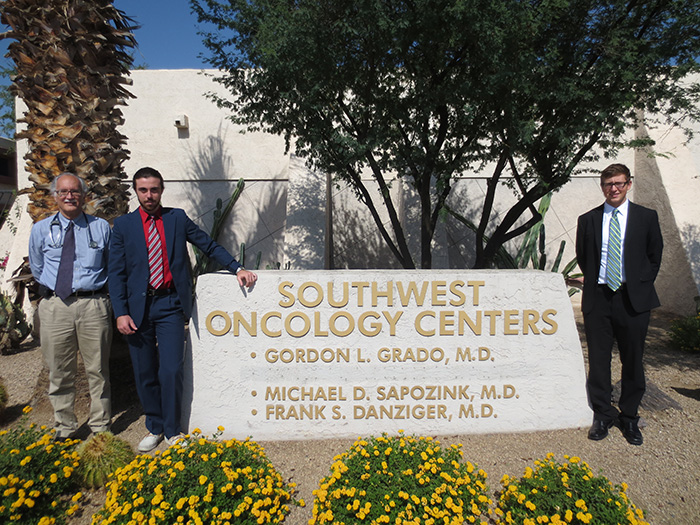Through ‘Life-changing’ Experience, EIU Alumnus Gives EIU Students a Leg Up
Apr-03-2015 |
| Dr. Gordon Grado, David Constantinescu and Robert Skolik |
David Constantinescu and Robert Skolik share a lot in common.
Both are honors students at Eastern Illinois University. Both have perfect 4.0 GPAs. They are roommates. They are co-captains of EIU’s men’s tennis team. And, they both spent two weeks in Scottsdale, Ariz., during July 2014 as the guests and mentees of Gordon Grado, founder/medical director of the Southwest Oncology Centers and the Grado Radiation Center of Excellence.
“It really was a life-changing experience,” Skolik, a junior pre-engineering student from Huntington, West Virginia, said. “I am so honored to have been chosen to be a part of it.”
Constantinescu, a senior pre-med student, concurred. “The opportunity was amazing,” he said.
Romanian-born Constantinescu, who now lives in Port Elgin, Ontario, Canada, became curious about the program as a freshman.
“Here was Dr. Grado, listed by U.S. News & World Report as among the top 1 percent of radiation oncologists, ‘skyping’ with students in Eastern’s pre-health program,” he said. “I was definitely interested.”
By Spring 2014, Constantinescu and Skolik were among the EIU hopefuls writing essays of applications. Resumes and grades were also a part of the competitive process. They learned they had been accepted while coming back from a tennis match.
Constantinescu looked at the opportunity as a way of strengthening his application for med school. Skolik, still wavering between a career in medicine or engineering, looked at the summer experience as the important, determining factor in deciding his future.
“When we arrived in Arizona, the Grados were extremely welcoming,” Skolik said. Mary Grado met the two students at the airport and accompanied them to the condo they would be occupying for the next two weeks. In addition to living quarters, the Grados also “gave us keys to a car we could use while we were there,” Constantinescu added.
The next day – the students’ first day at the clinic – the Grados “set us down to talk for an hour or two, explaining that while we were there, we couldn’t ask a stupid question,” Skolik recalled. “They let us know they were there to help us.”
In the days that followed, the two undergrads followed Dr. Grado and other medical professionals around the clinic as each explained his or her specific role.
“On the first day, we got to observe (Dr. Grado’s) signature surgery in the operating room,” Skolik said. “David and I, dressed in full scrubs and lead protection, got to stand right over (Dr. Grado’s) shoulder as he was offering narration of the surgery.
“We saw that same patient walking around a couple of days later,” Skolik continued. “It was one of several very fulfilling moments.”
Other moments of note included encounters with Grado’s patients who came to the clinics for more routine visits. The students were instructed to stand absolutely still so as not to distract the patients from the business at hand.
“And at 12 patients a day, that meant standing still for four to five hours a day,” Skolik recalled.
However, the time also allowed them ample time to observe the less clinical characteristics of a good doctor.
“Maintaining eye contact with the patient, the distance you keep between yourself and the patient… I had never given much thought to those kind of things before,” Skolik said.
“How you present yourself – your demeanor, your personality – are all important,” Constantinescu added. “Patients are scared, and you want to lessen that fear if you can. Confident, but welcoming.”
Although much of Grado’s work take place at his offices in Scottsdale and nearby Glendale, he operates a third, more rural, clinic in Yuma. Constantinescu and Skolik accompanied the doctor on one of his day trips to Yuma, taking advantage of opportunities a six-hour ride offers.
“We were on the road at 4 a.m. and got back at 10 p.m.,” Constantinescu said. “We drove three hours to get to the Yuma clinic and three hours back. And all the time we were shooting him questions.”
Constantinescu found in Grado a certain kindred spirit. “We discussed the problems he had, coming from a small community, too. And he helped confirm that that was not a disadvantage but, rather, that I would need to continue to look for opportunities I made for myself.”
Constantinescu understood. His aptitude at tennis had already earned him a full ride scholarship at Eastern.
“The opportunities are there,” he said. “I just need to open up the doors that will allow me to better myself.”
As Constantinescu and Skolik continue their education back on Eastern’s campus, they’re still contemplating their futures. Constantinescu definitely sees a career in medicine. But as for a specialty…
“I expect I’ll change my mind many, many times as I go through med school,” he said.
(Note: Since the internship, Constantinescu has worked with Dr. Grado on a medical manuscript on prostate cancer radiotherapy, expected to be presented for publication and presentation in peer reviewed literature and at a national conference later this year.)
*****
Related Stories:
Cancer Treatment Brings Allies Together...
Alumnus Advances Russell Means' Work through Art Exhibit on EIU Campus